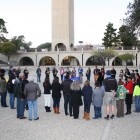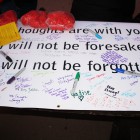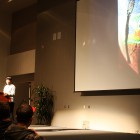Kerry Beeman
Writer
Chuck D of Public Enemies came to UCSB to speak at a commemoration held in honor of the people who died and were injured in the Haiti Earthquake that took place exactly one year earlier. The event was held Wednesday, January 12.
A candlelight vigil was held from 4:30 p.m until 5:15 p.m. in Storke Plaza. There was an open microphone for people to share their thoughts, talk about loved ones passed, and one inspired little boy even performed a rap honoring the people of Haiti. Donations in the amount of $3 to $5 were requested, and in turn, donators were given wrist bands that said “UCSB for Haiti”.
Then, at 7 p.m. in Corwin Pavilion, the two and a half hour commemoration included an opening song performed in Haitian, an informative power point, many moving pictures, multiple videos, and a variety of speakers and artists involved in the ongoing relief of Haiti and its people.
Both the candlelight vigil and the event in Corwin Pavilion were sponsored by four groups at UCSB: the Center for Black Studies Research, Associated Students, Black Quare, and the Black Studies Department.
Chryss Yost from the Center for Black Studies Research explained the significant link between our school and Haiti.
“UCSB is the place for Haitian studies in the west,” he said.
Yost went on to describe UCSB’s relationship to Haiti as similar to one of a small band you like, and then one day later, everyone is talking about them. UCSB has been involved in projects in Haiti for around 20 years and publishes the only academic journal about Haiti.
One of the messages portrayed during the events was a message of action. One documentary entitled “Poto Mitan: Post Earthquake Update” created by Yost demonstrated the lack of progress and ongoing help in Haiti. Haitians are even being denied food donations for fear that they will not move back into their homes (assuming that, on day, they will have homes again).
Haitian “houses” consist of tarps and tents that easily rip in the constant high winds. The water they are given is for washing, not drinking. This water is providing breeding grounds for cholera, which can lead to death if a person is not rehydrated within two hours.
A poster which was in the back of both events had the words “You will not be forsaken, you will not be forgotten”, said by President Obama, and was signed by attendees to show that though many people have forgotten the devastating Earthquake and the aftermath on the Haitian people, there are people continuing to dedicate time and resources to the people of Haiti.
A second compilation video, Stones from Heaven, created by Professor Paul Lobo Portuges was shown. The film used poetry, photographs, clips of news reports, and videos of the aftermath to successfully remind people of the horror of the widespread devastation.
The last message of the night was one of informed help. Though America generated more money for Haitians than has been generated for any other natural disaster, people did not know to which relief organization to give their donations. Anthony Morain, a representative from Direct Relief International, pointed out that organizations that have been at a location before a disaster hit will still be there long after other organizations are gone. Direct Relief International has been in Haiti for 40 years.
After an excited round of applause welcoming the main speaker to the stage, Chuck D began with a blunt statement.
“I know damn well this is not about me,” he said.
The former Public Enemy rapper saw that the best way in which he could help as an artist was to draw attention to the widespread destruction and colossal need for relief. Within 72 hours of the earthquake, he had gathered musicians to write, record, and master songs leading to the creation of Kombit Pou Haiti. More than $17,000 was earned from the 9-track album on iTunes, which all went to Haiti relief efforts.
Haiti is the poorest and least-developed country in the Western Hemisphere. Chuck D pointed out that Haiti has been in turmoil and that long before the natural disaster occurred, there were efforts to get them out of this situation – the earthquake merely intensified their need for help.
“Help Haiti, help the world, help if you can help, but the cheapest price to pay is attention,” concluded Chuck D.














Comments are closed.